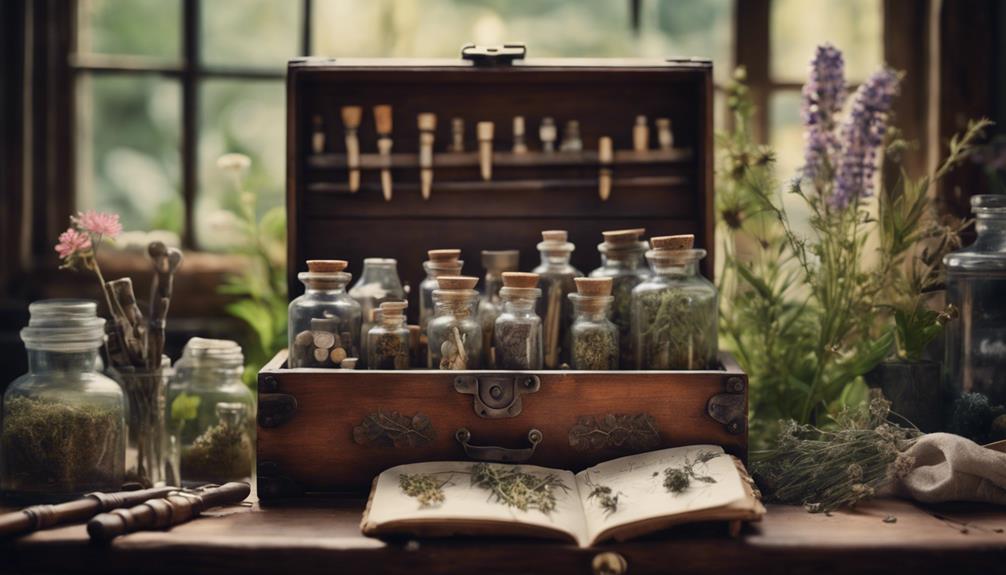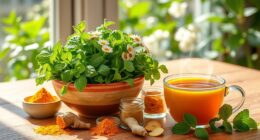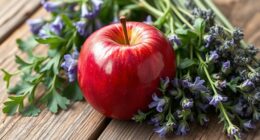We define herbalism as a traditional practice that harnesses the medicinal properties of plants to promote holistic well-being. Trained herbalists blend ancient knowledge with modern techniques to create personalized remedies that harmonize body, mind, and spirit. This holistic approach focuses on treating the root causes of ailments, rather than just symptoms, and acknowledges the intricate connection between our physical, mental, and spiritual health. By comprehending the history, principles, and applications of herbalism, we can tap into the full potential of plant-based remedies and take the first step towards a more balanced and conscious way of living, discovering the depths of this ancient practice.
Key Takeaways
• Herbalism involves using plants for medicinal purposes, blending traditional knowledge with modern techniques.
• Herbalists are experts in plant medicine, receiving training from accredited schools or through family traditions.
• Herbalism focuses on treating the whole person – body, mind, and spirit – to address root causes of ailments.
• It emphasizes natural balance restoration, tailoring treatments to individual needs and promoting harmony within and with nature.
• As a holistic approach, herbalism offers diverse remedies, including teas, tinctures, and topical applications, to promote wellness and conscious coexistence with the earth.
Understanding Herbalism Basics
So, what exactly is herbalism, and how does it work?
Herbalism involves using plants for medicinal purposes, such as teas, tinctures, and salves. As we explore the world of herbalism, we find that herbalists are experts in plant medicine, utilizing various plant parts like leaves, roots, and flowers.
Modern herbalists receive training from accredited schools or through family traditions, allowing them to create customized formulations based on individual needs to support wellness.
Herbalism is often used as complementary medicine alongside conventional practices for maintaining good health. This traditional approach to health has been practiced for centuries, with modern herbalists blending traditional knowledge with modern techniques.
History of Herbal Medicine

As we explore the world of herbalism, we're naturally led to wonder about the origins of this ancient practice, and the history of herbal medicine reveals a rich tapestry of cultural and scientific discoveries.
The use of medicinal plants dates back to the Paleolithic age, showcasing the ancient roots of herbal medicine. Written evidence of herbal remedies dates back over 5,000 years, highlighting the longstanding history of herbal medicine.
Traditional Chinese medicine practices, for instance, contributed to the discovery of artemisinin, a potent antimalarial drug. Native Americans utilized 2,500 plant species for medicinal purposes, showcasing the diverse plant knowledge in different cultures.
In ancient Egyptian times, traditional medicine practices incorporated herbal remedies into healing practices. The history of herbal medicine is a tribute to the ingenuity and resourcefulness of our ancestors, who discovered and utilized the healing properties of plants to create effective herbal remedies.
Through their discoveries, we've inherited a wealth of plant knowledge that continues to shape our understanding of herbal medicine today.
Principles of Holistic Healing

As we explore the principles of holistic healing in herbalism, we'll examine how this approach considers the intricate connection between our body, mind, and spirit, recognizing that restoring natural balance is key to achieving wholeness.
We'll see how herbalism focuses on addressing the root causes of ailments, rather than just masking symptoms, and how this approach prioritizes preventive care and lifestyle adjustments for long-term wellness.
Body, Mind, Spirit Connection
We believe that the intricate connection between our body, mind, and spirit is the foundation of holistic healing in herbalism. This interconnectedness is at the heart of herbalism, recognizing that our physical, emotional, and spiritual well-being are intimately linked.
As practitioners of herbalism, we recognize that addressing the root cause of ailments is essential to promoting overall health and wellness. This personalized approach considers individual needs and constitution, acknowledging that each person's journey to wellness is unique.
By acknowledging the interconnectedness of body, mind, and spirit, we can develop targeted, holistic treatment plans that address the whole person, not just the symptoms. This approach empowers individuals to achieve lasting wellness by restoring balance and harmony within their bodies.
In herbalism, we focus on treating the entire person, rather than just the symptoms, to achieve optimal health and well-being. By embracing this holistic approach, we can tap into the full potential of herbalism and cultivate a deeper understanding of our intricate connection to ourselves and the world around us.
Natural Balance Restoration
By recognizing the intricate connection between body, mind, and spirit, we can now focus on restoring natural balance in the body, which is the foundation of holistic healing in herbalism. This approach emphasizes treating the root cause of ailments rather than just managing symptoms, allowing us to address the underlying issues that disrupt our well-being.
Through personalized treatments, we can tailor our approach to individual needs, promoting peak health and overall well-being. The goal of herbalism is to harmonize the body, mind, and spirit, recognizing that each aspect is interconnected and interdependent. By doing so, we can experience long-term health benefits that extend beyond just physical health.
Herbalism's holistic approach acknowledges that our physical, emotional, and spiritual well-being are intertwined, and that restoring natural balance is essential for achieving peak health. By adopting this approach, we can move beyond just treating symptoms and instead focus on achieving true wellness.
Wholeness Through Nature
In embracing the principles of holistic healing, we find that wholeness through nature isn't just a concept, but a lived experience that transforms our relationship with our bodies, minds, and the natural world.
Through herbalism, we recognize that our well-being is intricately connected to the natural world. By using whole plants, we can harness their full healing potential and restore balance to our bodies.
This holistic approach to health encourages us to develop a deeper connection with nature, recognizing that our individual well-being is intertwined with the well-being of the earth. As we cultivate harmony within ourselves, we also cultivate harmony with the natural world.
Herbalism's focus on natural remedies and holistic healing allows us to address the root causes of illness, rather than just alleviating symptoms. By embracing this approach, we can experience wholeness through nature, where our bodies, minds, and spirits are in harmony.
This connection with nature is essential to our overall well-being, and herbalism provides a powerful tool for achieving it.
Role of Herbalists in Healthcare

Herbalists take center stage in healthcare, playing an essential role in identifying the underlying causes of illnesses and developing personalized treatment plans that harness the power of plant medicine. We rely on their expertise to select the right herbs for our specific symptoms, combining them in unique ways to create effective herbal treatments.
These treatments can take many forms, from teas and capsules to oils and skin creams, all designed to support our wellness and restore our health. But what makes a skilled herbalist? We look for those who've completed rigorous education and training, earning certifications from reputable organizations like the American Herbalist Guild.
When seeking herbal remedies, we must prioritize safety, consulting with licensed herbalists and our doctors to confirm safe and effective use. By doing so, we can trust that our healthcare is in good hands, with herbalists guiding us towards wholeness and wellness through the ancient wisdom of plant medicine.
Types of Herbal Remedies

As we explore the world of herbalism, we find a diverse range of remedies that cater to our unique health needs, from soothing teas to potent tinctures and topical applications.
Herbal remedies, an essential part of alternative medicine practices like herbalism, offer a variety of options to promote wellness. We can brew herbal teas through infusions, decoctions, and maceration techniques to create calming and rejuvenating beverages.
Tinctures, on the other hand, are alcoholic extracts of herbs that can be used for medicinal purposes. In addition, herbal oils, salves, and creams can be applied topically to harness their therapeutic benefits. Compresses and soaks can also be used to target specific areas of the body.
Moreover, extracts can be consumed in various forms, such as capsules or tablets, to support our health. By understanding the different types of herbal remedies, we can make informed choices about our health and wellness.
Safety and Efficacy Concerns

While we're drawn to the benefits of herbalism, we must acknowledge the safety and efficacy concerns that come with using these remedies, concerns that can be mitigated with caution and awareness.
Herbal supplements, in particular, lack stringent regulations, which raises concerns about their safety and efficacy. It's important to seek the approval of a doctor before trying herbal treatments to guarantee safety.
We must also be vigilant about monitoring for side effects like nausea or dizziness when using herbal remedies. If we experience adverse reactions to herbal supplements, we should report them to the FDA for further investigation.
To minimize risks, we should follow dosage instructions carefully and seek the guidance of licensed herbalists. By taking these precautions, we can enjoy the benefits of herbalism while minimizing the risks.
Modern Applications of Herbalism

We're embracing modern applications of herbalism that cater to our unique needs and promote a harmonious relationship with the environment. As an alternative medicine, herbalism offers a holistic approach to health concerns, utilizing plant-based remedies that are tailored to individual needs. This approach not only addresses physical health but also promotes sustainability, encouraging a conscious coexistence with the earth.
Some of the modern applications of herbalism include:
- Herbal healing methods, such as teas, tinctures, extracts, compresses, soaks, and salves, that are designed to address specific health concerns.
- Modern herbalists receiving training from accredited schools or through family traditions, allowing for specialization in various areas of herbalism.
- The growth of herbalism as a natural healthcare practice, reflecting a shift towards more holistic and sustainable approaches to health and wellness.
As we move forward, it's essential to recognize the importance of herbalism in modern healthcare. By embracing these modern applications, we can promote a more sustainable and holistic approach to health, aligning with the principles of natural healthcare practices.
Frequently Asked Questions
What Does Herbalist Actually Do?
As herbalists, we take a holistic approach to wellness by creating customized plant-based remedies to address individual health concerns.
We assess each person's unique needs, considering their medical history, lifestyle, and environmental factors. Then, we develop tailored formulations using medicinal plants to promote balance and restore health.
Our goal is to empower individuals to take control of their well-being, often in conjunction with conventional medical practices.
What Is the Practice of Herbalism?
As we explore the world of herbalism, we find that the practice itself involves using plants to promote health and healing.
We create personalized treatments based on individual symptoms and needs, incorporating various forms such as teas, capsules, oils, and creams.
Our training varies, with some programs offering certifications and requiring clinical experience.
Is Herbalism Illegal in the Us?
We're glad to set the record straight: herbalism isn't illegal in the US. In fact, herbalists can legally practice and offer herbal treatments.
The FDA regulates herbal supplements as food rather than medications, which allows the industry to grow.
It's essential, though, to seek licensed herbalists for safe and effective treatments.
What Does Herbalism Treat?
We're diving into the world of herbalism, where plants are the ultimate game-changers!
So, what does herbalism treat? Well, the list is long, but we'll give you the CliffsNotes version: digestive woes, insomnia, anxiety, skin issues, and respiratory problems – you name it!
From chamomile's calming effects to ginger's anti-inflammatory powers, herbal remedies have got your back (and the rest of your body).
Conclusion
As we conclude our exploration of herbalism, we're reminded of the power of nature-based remedies.
Take, for instance, the case of a 40-year-old woman suffering from chronic anxiety, who found relief in a passionflower and valerian root tea blend.
By embracing herbalism's holistic approach, we can tap into the therapeutic potential of plants, fostering a deeper connection with the natural world and our own well-being.
As we move forward, let's continue to harness the wisdom of herbalism, marrying ancient traditions with modern scientific understanding.










